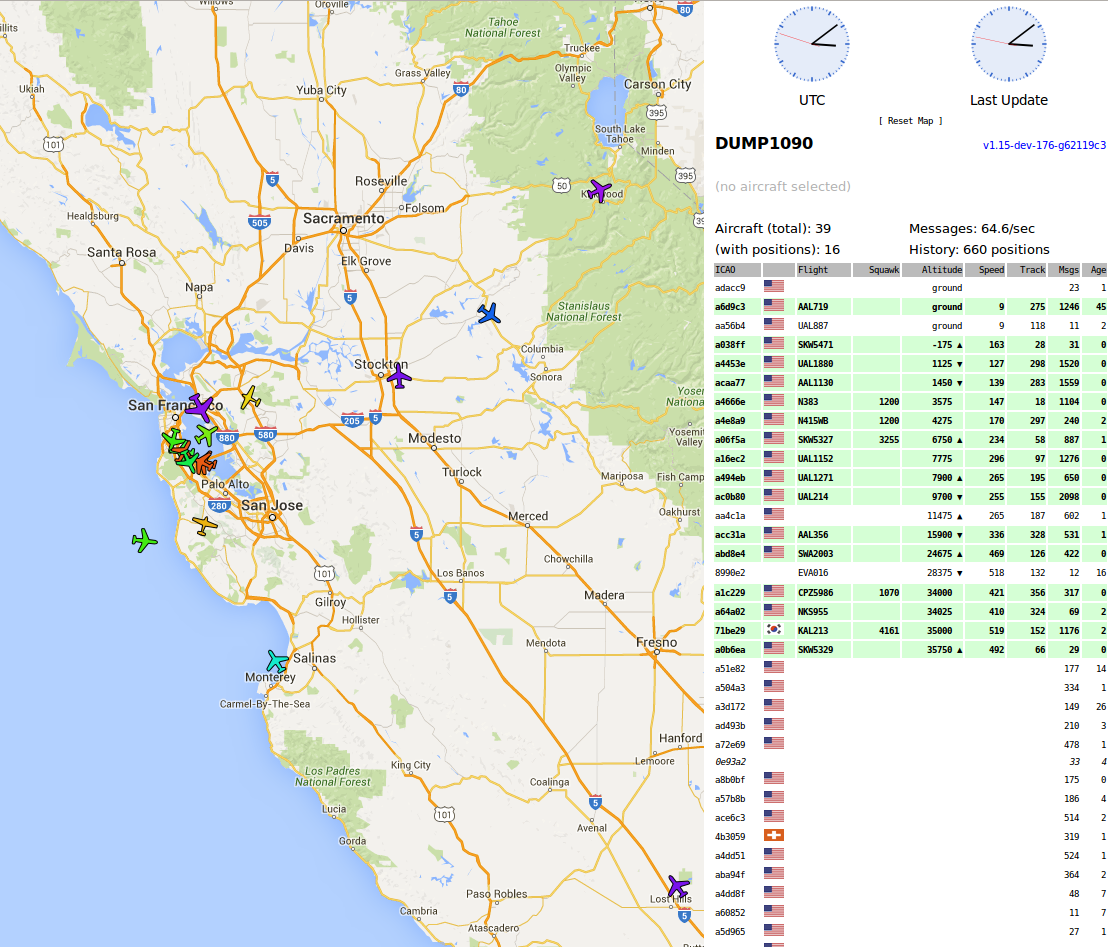 dump1090 visualizing the output of the bladeRF ADS-B VHDL decoder.
dump1090 visualizing the output of the bladeRF ADS-B VHDL decoder.
This repository contains all of the neccessary files to simulate, and build the ADS-B core. A multipart tutorial series detailing the implementation of the ADS-B core can be found here.
The ADS-B decoder decodes signals directly in the FPGA as opposed to on a CPU. The hardware acceleration gains are used to increase the range of the ADS-B receiver by performing operations that could not run in realtime even on a recent Intel i7. The decoder attempts to detect and resolve many bit errors and correct for packet collisions; features that up until now have only been available in commercial ADS-B decoders.
The ADS-B decoder runs on the FPGA, and sends fully decoded messages whose CRC pass to libbladeRF. The bladeRF-adsb user-mode utility that is found in this repository takes the decoded messages and sends them to a dump1090 server listening on port 30001. dump1090 can then be used to visualize the location of planes (as can be seen in the screenshot above).
The decoder runs on any bladeRF including the bladeRF x40 and bladeRF x115. Any low noise amplifier works with the bladeRF, however there is a bladeRF specific LNA available, the XB-300.
The bladeRF project repository, https://github.com/Nuand/bladeRF, contains installation guides for most operating systems.
$ git clone https://github.com/mutability/dump1090.git
$ cd dump1090
$ make
$ ./dump1090 --net-only --raw --interactive
More information about dump1090 can be found on the project's Github.
Once dump1090 is running visit the HTTP server setup by dump1090 at http://localhost:8080
$ git clone https://github.com/Nuand/bladeRF-adsb
$ cd bladeRF-adsb/bladeRF_adsb
$ wget http://nuand.com/fpga/adsbx40.rbf
$ wget http://nuand.com/fpga/adsbx115.rbf
$ make
$ ./bladeRF_adsb
This will compile and run the user-mode utility that interfaces with the VHDL decoder. The user-mode program loads the prebuilt ADS-B decoder FPGA image. As soon as a message is received from the FPGA it is displayed to the command line and also transmitted to dump1090 for visualization. Once messages get displayed in the command line, they will appear on the local dump1090 HTTP server.
The ADS-B decoder is a core that substantially modifies the operation of the bladeRF FPGA. The core has its own FPGA revision called "adsb" separate from the normal "hosted" image. To compile the core, fetch a recent snapshot of the existing bladeRF repository. Afterwards, clone this repository in to hdl/fpga/ip/nuand.
$ git clone http://github.com/Nuand/bladeRF.git
$ cd bladeRF
$ cd hdl/fpga/ip/nuand
$ git clone http://github.com/Nuand/bladeRF-adsb.git adsb
Once the repository is setup, use the standard FPGA build directions to build the ADS-B decoder image.
$ ./build_bladerf.sh -r adsb -b bladeRF -s 40
And if building for an x115,
$ ./build_bladerf.sh -r adsb -b bladeRF -s 115
And for the bladeRF 2.0 micro,
$ ./build_bladerf.sh -r adsb -b bladeRF-micro -s A4
$ ./build_bladerf.sh -r adsb -b bladeRF-micro -s A5
$ ./build_bladerf.sh -r adsb -b bladeRF-micro -s A9